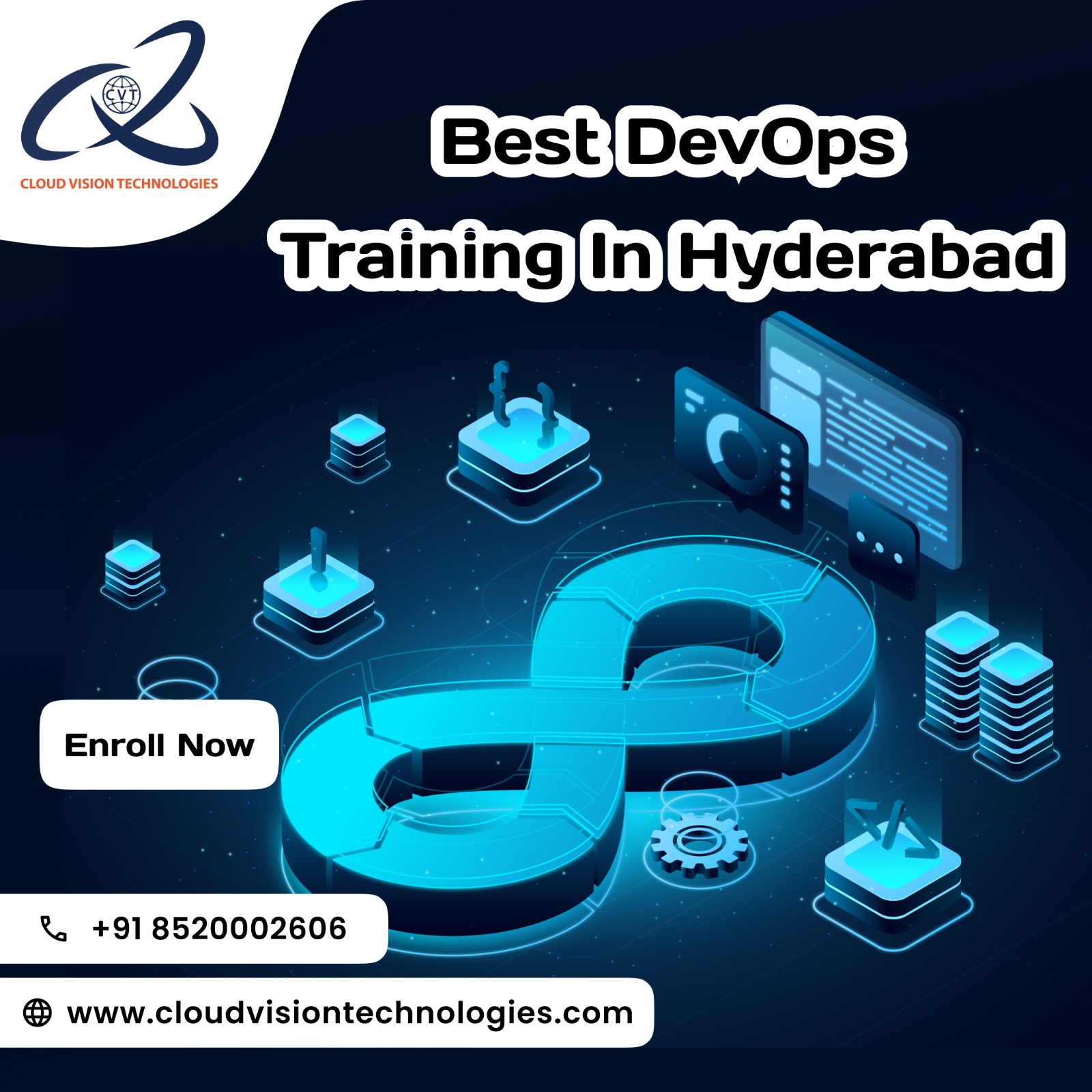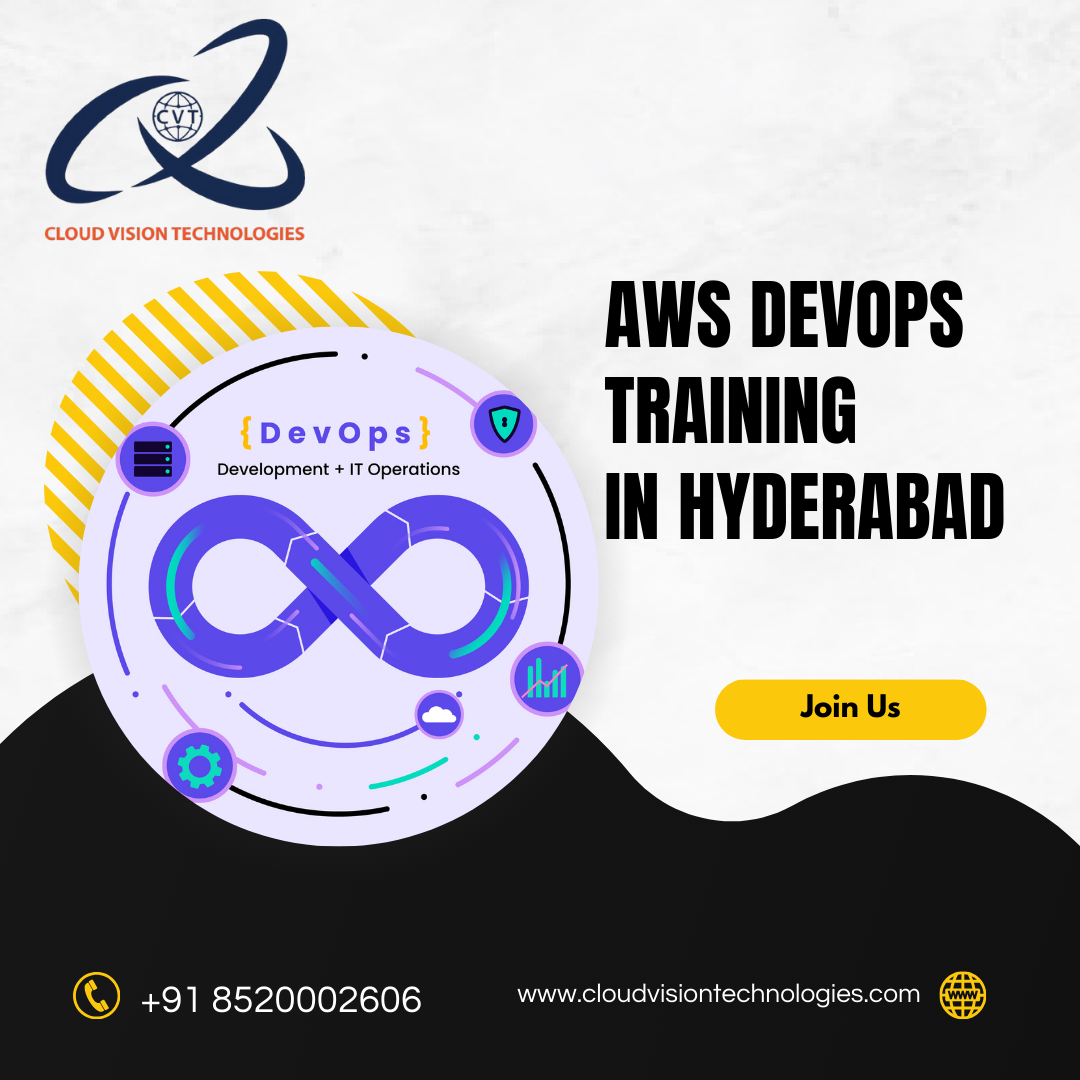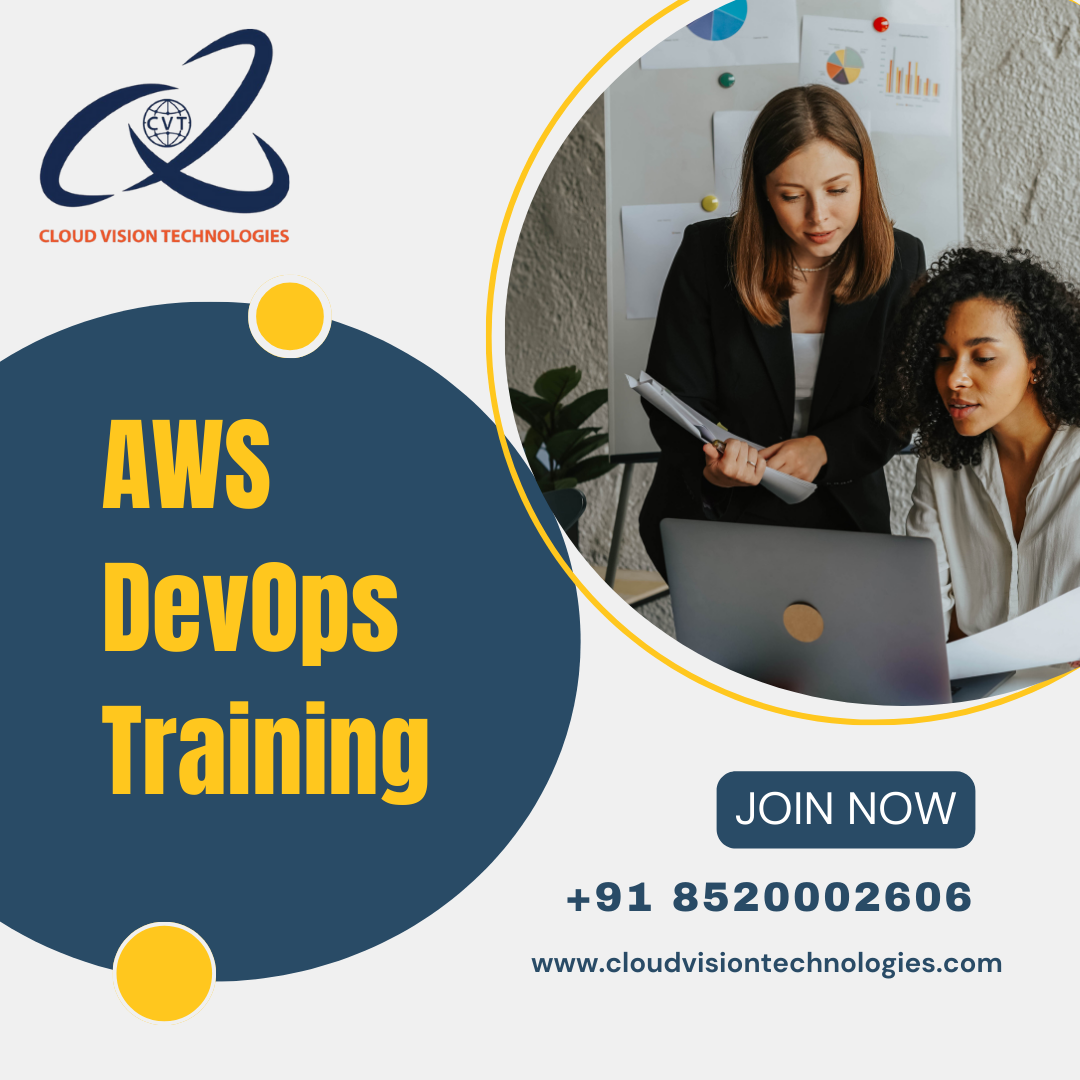
DevOps Training in Hyderabad
Introduction:
In today’s fast-paced digital world, delivering high-quality software quickly and efficiently is crucial for business success. This is where DevOps comes into play a culture, methodology, and set of practices that bridge the gap between Development and Operations teams. By fostering collaboration, automation, and continuous delivery, DevOps has revolutionized the way organizations build, test, and deploy software. Cloud Vision Technologies.
What is DevOps?
DevOps is a combination of “Development” and “Operations.” It is not just a technology or a tool but a cultural shift that emphasizes communication, collaboration, and integration between software developers and IT operations. The primary goal is to shorten the development life cycle while ensuring the continuous delivery of high-quality software.
![]()
![]()

Key Principles of DevOps
Collaboration:
At its core, DevOps is about breaking down silos between development and operations teams. Traditionally, these teams worked in isolation, leading to miscommunication, delays, and inefficiencies. DevOps promotes a culture where both teams work together from the beginning of the software development life cycle. This collaboration fosters better understanding, faster problem-solving, and shared accountability for the final product. When developers and operations personnel collaborate closely, it ensures smoother deployments and quicker resolutions to production issues. DevOps Training in Hyderabad.
Automation:
Automation is a fundamental pillar of DevOps. In modern software development, repetitive tasks such as building, testing, and deployment can slow down the entire process if done manually. DevOps leverages automation tools to streamline these tasks, ensuring consistency, speed, and reduced human error. By automating build pipelines, testing environments, and deployments, organizations can release software updates more frequently and reliably. Automation also allows developers to focus on innovation and problem-solving rather than mundane tasks, boosting overall productivity. DevOps Training in Hyderabad. DevOps Training in Hyderabad.
Continuous Integration (CI) and Continuous Delivery (CD):
Continuous Integration (CI) and Continuous Delivery (CD) are essential practices in DevOps that ensure code changes are integrated, tested, and deployed frequently. In CI, developers merge their code changes into a shared repository multiple times a day. Each merge is automatically tested, allowing teams to detect and fix bugs early. CD takes it a step further by automating the release of code to production once it passes all tests. This enables organizations to deliver software faster and with greater confidence. CI/CD not only accelerates development cycles but also improves software quality by identifying issues early in the process. DevOps Training in Hyderabad.
Infrastructure as Code (IaC):
Infrastructure as Code (IaC) is a game-changer in managing IT infrastructure. Instead of manually configuring servers, networks, and storage, IaC allows teams to define infrastructure using machine-readable code. This approach ensures consistency, scalability, and ease of replication across different environments. With IaC, organizations can quickly provision resources, reduce configuration drift, and improve disaster recovery. Tools like Terraform and AWS CloudFormation are popular for implementing IaC. By treating infrastructure the same way as application code, DevOps teams can achieve faster deployments and more reliable systems. DevOps Training in Hyderabad.
Monitoring and Feedback:
Continuous monitoring and feedback are critical for maintaining high performance and reliability in software systems. In DevOps, monitoring is not just about detecting issues; it’s about gaining real-time insights into system performance, user behavior, and application health. Tools such as Prometheus, ELK Stack, and Datadog help track metrics, logs, and alerts, allowing teams to identify and resolve issues before they impact end-users. Additionally, feedback loops from end-users and stakeholders provide valuable insights to improve future releases. Continuous monitoring and feedback ensure that the software evolves to meet user needs while maintaining stability and performance.
DevOps Lifecycle
The DevOps lifecycle is a continuous process designed to improve software development and deployment by promoting collaboration, automation, and continuous feedback. It consists of several key stages that work in a loop to ensure the efficient delivery of high-quality software. Each stage is interconnected, forming a seamless pipeline where improvements are continuously integrated and deployed. Let’s explore each stage in detail:
Plan:
The first stage of the DevOps lifecycle is planning, where teams define the project requirements and set clear objectives for development. This phase involves collaboration between stakeholders, product managers, developers, and operations teams to understand business goals and user needs. Agile methodologies are often employed to break down the project into smaller, manageable tasks. Well-structured planning helps in prioritizing features, estimating timelines, and aligning the team towards a common goal. Clear documentation and open communication are essential to avoid misunderstandings and ensure everyone is on the same page. DevOps Training in Hyderabad.
Develop:
Once the planning phase is complete, the development phase begins. In this stage, developers write, build, and code the application based on the requirements gathered. Modern DevOps practices encourage frequent code commits and collaboration through version control systems like Git, allowing multiple developers to work simultaneously on different parts of the project. Continuous integration (CI) tools help in automatically merging code changes and running tests to ensure code quality. By encouraging incremental and iterative development, teams can quickly adapt to changes and maintain agility throughout the process. DevOps Training in Hyderabad.
Build and Test:
The build and test phase is crucial for ensuring that the code is reliable and free of bugs. Automated build tools like Jenkins and GitHub Actions compile the code, resolve dependencies, and create executable artifacts. Automated testing frameworks are then used to run unit, integration, and functional tests. Continuous testing ensures that defects are caught early, reducing the cost and time required to fix issues later in the development cycle. With every code change passing through rigorous testing, the final product is more stable and ready for deployment. DevOps Training in Hyderabad.
Release:
The release phase involves deploying the tested software to production environments. This is where continuous delivery (CD) practices come into play, ensuring that the software is automatically packaged and made ready for release. In DevOps, release cycles are frequent and incremental, allowing organizations to deliver new features and updates to users more quickly. By automating the release process, teams can reduce manual errors, improve deployment speed, and minimize downtime. Effective release management also includes rollback mechanisms to revert changes if issues are detected after deployment. DevOps Training in Hyderabad.
Deploy:
Deployment is the process of delivering the software to end users. In DevOps, deployment is often automated to ensure consistency and reliability. Tools like Docker and Kubernetes help in containerizing applications and orchestrating deployments across multiple environments. Continuous deployment enables teams to push code changes to production immediately after they pass testing, ensuring that new features and bug fixes reach users faster. Automated deployments reduce human intervention, minimize downtime, and enable faster recovery in case of failures. DevOps Training in Hyderabad.
Operate:
Once the software is deployed, the operation phase focuses on managing and monitoring the application in the production environment. This includes performance monitoring, security management, and incident response. Tools like Prometheus, Nagios, and Datadog help track system metrics such as CPU usage, memory utilization, and response times. Proactive monitoring allows teams to identify performance bottlenecks and potential issues before they impact users. Additionally, incident management processes ensure quick recovery from system failures, maintaining service availability and reliability. DevOps Training in Hyderabad.
Monitor:
The final stage in the DevOps lifecycle is continuous monitoring and feedback. Monitoring doesn’t stop after deployment; it continues to gather data from users, system logs, and performance metrics. Feedback from users, stakeholders, and analytics tools is invaluable for identifying areas of improvement and guiding future development efforts. Continuous monitoring also helps in ensuring compliance, security, and scalability. By incorporating feedback into the planning phase, the DevOps lifecycle becomes a continuous loop of improvement, enabling organizations to evolve and adapt to changing needs. DevOps Training in Hyderabad.

Popular DevOps Tools
DevOps relies on a diverse set of tools to streamline processes, automate tasks, and enable continuous integration, delivery, and deployment. These tools are essential for managing complex software systems and ensuring the efficient delivery of high-quality products. Let’s take a closer look at some widely used DevOps tools: DevOps Training in Hyderabad.
Version Control: Git
Version control is the backbone of modern software development, and Git is the most popular version control system used in DevOps. It allows developers to track code changes, collaborate seamlessly, and manage multiple versions of a project. With Git, developers can work on different branches, merge changes, and revert to previous versions if needed. Platforms like GitHub, GitLab, and Bitbucket provide hosting services for Git repositories along with features such as pull requests and issue tracking. Version control not only enhances collaboration but also ensures code integrity throughout the development lifecycle. DevOps Training in Hyderabad.
CI/CD Tools: Jenkins, GitHub Actions
Continuous Integration (CI) and Continuous Delivery (CD) are crucial for automating software development pipelines. Jenkins is one of the most popular open-source CI/CD tools, offering flexibility through numerous plugins. It enables developers to build, test, and deploy applications automatically, reducing manual effort and minimizing errors. Similarly, GitHub Actions integrates seamlessly with GitHub repositories, allowing developers to create custom workflows for building, testing, and deploying code. These tools ensure that code changes are tested and deployed quickly, maintaining the agility required for frequent releases. DevOps Training in Hyderabad.
Containerization: Docker
Containerization has revolutionized software deployment by allowing applications to run consistently across different environments. Docker is the leading containerization platform that packages applications and their dependencies into lightweight containers. These containers are portable, efficient, and ensure that the application behaves the same way in development, testing, and production environments. Docker simplifies deployment by eliminating compatibility issues, speeding up releases, and optimizing resource utilization. Its integration with CI/CD pipelines makes it a vital tool for modern DevOps practices. DevOps Training in Hyderabad.
Orchestration: Kubernetes
As organizations scale their use of containers, managing hundreds or thousands of containers manually becomes challenging. This is where Kubernetes comes in. Kubernetes is an open-source container orchestration platform that automates the deployment, scaling, and management of containerized applications. It handles load balancing, service discovery, self-healing, and rolling updates, ensuring high availability and resilience. Kubernetes works seamlessly with Docker and other container runtimes, making it a key tool for large-scale DevOps operations. Its ability to manage complex distributed systems has made it the de facto standard for container orchestration. DevOps Training in Hyderabad.

Monitoring: Prometheus, ELK Stack (Elasticsearch, Logstash, Kibana)
Monitoring and logging are essential to maintain the health and performance of software systems. Prometheus is a popular open-source monitoring tool that collects real-time metrics on system performance, resource utilization, and application health. It uses a time-series database and provides powerful querying capabilities for generating alerts and dashboards. DevOps Training in Hyderabad.
The ELK Stack consists of Elasticsearch (for search), Logstash (for log collection and processing), and Kibana (for visualization) is another widely used tool for centralized logging and monitoring. It helps DevOps teams aggregate logs from multiple sources, detect anomalies, and visualize data for better insights. Together, these tools help organizations proactively identify and resolve issues before they impact users. DevOps Training in Hyderabad.
Cloud Services: AWS, Azure, Google Cloud
Cloud services have become integral to DevOps due to their scalability, flexibility, and cost efficiency. Amazon Web Services (AWS), Microsoft Azure, and Google Cloud Platform (GCP) are the top cloud service providers that offer a wide range of services for computing, storage, networking, and security. These platforms provide infrastructure on demand, allowing organizations to scale resources based on their needs. They also support DevOps tools for CI/CD, monitoring, and security. AWS services like EC2 (compute), S3 (storage), and SNS (messaging) are widely used in DevOps pipelines. Similarly, Azure DevOps and Google Cloud’s CI/CD tools offer seamless integration for faster deployments. DevOps Training in Hyderabad.
Benefits of DevOps
DevOps offers numerous advantages that help organizations improve efficiency, collaboration, and overall software quality. By fostering a culture of continuous improvement and leveraging automation, DevOps addresses many of the challenges traditionally faced in software development and deployment. Here are some of the key benefits: DevOps Training in Hyderabad.
Faster Deployment:
One of the primary benefits of DevOps is the ability to accelerate software delivery. Traditional development cycles often involve long delays between coding, testing, and deployment. DevOps introduces automation in build pipelines, testing, and deployment processes, enabling organizations to release updates more frequently and reliably. Continuous Integration (CI) and Continuous Delivery (CD) ensure that code changes are rapidly built, tested, and deployed, reducing the time it takes to bring features and fixes to market. Faster deployment not only provides a competitive edge but also allows organizations to respond quickly to customer feedback and market changes. DevOps Training in Hyderabad
Improved Collaboration:
DevOps breaks down the traditional silos between development and operations teams, fostering a culture of collaboration and shared responsibility. In the past, development teams focused solely on coding, while operations teams managed infrastructure and deployments. This disconnect often led to misunderstandings and blame during production issues. With DevOps, both teams work together from the start of the project, sharing knowledge, responsibilities, and goals. This collaboration leads to better communication, faster problem-solving, and a more cohesive working environment. When teams collaborate effectively, the overall efficiency and morale improve significantly. DevOps Training in Hyderabad.
Higher Quality:
DevOps emphasizes automation and continuous feedback, which improves the overall quality of software. Automated testing tools run multiple tests on every code change, identifying bugs early in the development process. This early detection prevents issues from escalating to production, where they are more costly to fix. Continuous monitoring tools provide real-time insights into system performance, allowing teams to detect and resolve performance issues proactively. Additionally, frequent and incremental releases make it easier to isolate and fix issues, ensuring that each update is stable and reliable. With continuous improvement at its core, DevOps helps organizations maintain high standards of quality. DevOps Training in Hyderabad.
Scalability:
Scalability is essential for modern applications that need to handle fluctuating workloads and growing user demands. DevOps enables organizations to efficiently scale infrastructure and applications using automation and cloud services. Tools like Kubernetes and Terraform allow for the automatic provisioning and scaling of resources based on demand. Whether it’s scaling up during peak traffic or scaling down to save costs during off-peak hours, DevOps ensures that resources are used efficiently. By automating scalability, organizations can maintain high performance and availability without manual intervention. DevOps Training in Hyderabad.
Security (DevSecOps):
Security is often considered an afterthought in traditional software development, but DevOps integrates security practices throughout the development life cycle — a concept known as DevSecOps. By embedding security checks into every stage of the pipeline, from code analysis to vulnerability scanning and compliance monitoring, DevSecOps ensures that security is not compromised for speed. Automation tools can detect security vulnerabilities early, reducing the risk of security breaches. Continuous monitoring also helps in identifying and addressing security threats in real-time. By prioritizing security alongside development and operations, organizations can deliver secure software without slowing down the release process. DevOps Training in Hyderabad.
Challenges in Implementing DevOps
While DevOps offers numerous benefits, adopting it is not without its challenges. Transitioning from traditional software development and operations models to a collaborative and automated DevOps approach requires significant organizational changes. Many companies face hurdles related to culture, tools, and skills. Let’s explore some of the key challenges in implementing DevOps: DevOps Training in Hyderabad.
Cultural Resistance:
One of the most significant obstacles in implementing DevOps is overcoming cultural resistance. In many organizations, development and operations teams have worked in silos for years, each with its own goals, processes, and priorities. Changing this mindset to promote collaboration, shared responsibility, and continuous improvement is difficult. Teams may resist change due to fear of the unknown, loss of control, or concerns about increased workload. Leadership plays a crucial role in addressing this challenge by fostering a culture that encourages open communication, continuous learning, and rewarding collaboration. Without cultural alignment, even the best DevOps tools and processes will struggle to deliver the intended benefits. DevOps Training in Hyderabad.
Tool Overload:
The DevOps ecosystem is vast, with countless tools available for automation, integration, monitoring, security, and deployment. While having multiple options is beneficial, it can also be overwhelming for organizations trying to choose the right tools for their needs. Each tool has its strengths and weaknesses, and integrating multiple tools can lead to complexity, compatibility issues, and increased maintenance overhead. Over-reliance on tools without understanding the underlying processes can also result in inefficiencies. Organizations must carefully evaluate and select tools that align with their goals and infrastructure while ensuring seamless integration within their DevOps pipeline. Striking the right balance between tool adoption and simplicity is key to avoiding tool overload. DevOps Training in Hyderabad.
Skill Gap:
Implementing DevOps requires a combination of technical expertise and collaborative skills. Not all organizations have teams with the necessary skills to automate processes, manage infrastructure as code (IaC), and work across development and operations. The shift from traditional roles to more integrated, cross-functional teams can be challenging for individuals who are used to specialized tasks. DevOps Training in Hyderabad.
Training and upskilling are essential to bridge this gap. Investing in certifications, workshops, and continuous learning programs helps team members adapt to new technologies and methodologies. Additionally, hiring skilled professionals with experience in automation, containerization, and cloud infrastructure can accelerate the DevOps journey. Without addressing the skill gap, organizations may face slow adoption and inconsistent results. DevOps Training in Hyderabad.
DevOps Training in Hyderabad:
As technology evolves, DevOps continues to mature. The rise of AI and Machine Learning is enhancing automation and predictive analytics. DevSecOps is embedding security into the DevOps pipeline, ensuring safer software. The future of DevOps is bright as more organizations recognize its potential to deliver business value. DevOps Training in Hyderabad.

Conclusion:
DevOps is more than just a methodology; it’s a cultural shift that empowers organizations to deliver high-quality software at speed. By combining automation, continuous feedback, and collaboration, DevOps is transforming how businesses operate in the digital age. Embracing DevOps is no longer optional; it’s essential for staying competitive in an ever-changing technological landscape. DevOps Training in Hyderabad.
Address: Samhitha Enclave, 3rd Floor, KPHB Phase 9, Kukatpally, Hyderabad, Telangana – 500072
Phone: +91 8520002606
Email: info@cloudvisiontechnologies.com
Website: www.cloudvisiontechnologies.com





